| Kirkuk | |
|---|---|
| Country | Iraq |
| Region | Iraq |
| Location | Baba Gurgur |
| Offshore/onshore | Onshore |
| Field history | |
| Discovery | 1927 |
| Start of production | 1934 |
| Production | |
| Recoverable oil | 10,000 million barrels (~1.7×109 t) |
Kirkuk Field is an oilfield in Kirkuk, Iraq. It was discovered by the Turkish Petroleum Company at Baba Gurgur in 1927. The oilfield was brought into production by the Iraq Petroleum Company (IPC) in 1934 when the 12-inch pipelines from Kirkuk (British-ruled Mandatory Iraq) to Haifa (Mandatory Palestine) and Tripoli (French-ruled Greater Lebanon) were completed. It has ever since remained the most important part of northern Iraqi oil production with over 10 billion barrels (1.6 billion cubic metres) of proven remaining oil reserves in 1998. After about seven decades of operation, Kirkuk still produces up to 1 million barrels per day (160,000 cubic metres per day), almost half of all Iraqi oil exports.[ citation needed ] Oil from the Kirkuk oilfield is now exported through the Kirkuk–Ceyhan Oil Pipeline, which runs to the Turkish port of Ceyhan on the Mediterranean Sea.
Some analysts believe that poor reservoir-management practices during the Saddam Hussein years may have seriously, and even permanently, damaged Kirkuk's oilfield. One example showed an estimated 1.5 billion barrels (240 million cubic metres) of excess fuel oil being reinjected. Other problems include refinery residue and gas-stripped oil. Fuel oil reinjection has increased oil viscosity at Kirkuk making it more difficult and expensive to get the oil out of the ground. [1]
On 11 July 2014 Kurdistan Regional Government forces seized control of the Kirkuk oilfield, together with the Bai Hassan field, prompting a condemnation from Baghdad and a threat of "dire consequences," if the oilfields were not returned to Iraq's control. [2]
In the aftermath of the Kurdish Referendum, as part of 2017 Iraqi–Kurdish conflict, the control of the oil fields, along with almost all of Kirkuk Governorate, returned to the government of Iraq.

Kirkuk is a city in Iraq, serving as the capital of the Kirkuk Governorate, located 238 kilometres north of Baghdad. The city is home to a diverse population of Kurds, Iraqi Turkmens and Arabs. Kirkuk sits on the ruins of the original Kirkuk Citadel which sits near the Khasa River.

The Iraq Petroleum Company (IPC), formerly known as the Turkish Petroleum Company (TPC), is an oil company that had a virtual monopoly on all oil exploration and production in Iraq between 1925 and 1961. It is jointly owned by some of the world's largest oil companies and headquartered in London, England. However, today it is only a paper entity with historical rights and plays no part in the modern development of Middle Eastern oil.
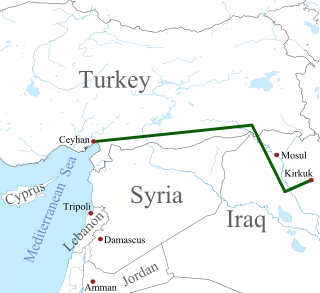
The Kirkuk–Ceyhan Oil Pipeline, also known as the Iraq–Turkey Crude Oil Pipeline, is a 600-mile-long (970 km) pipeline that runs from Kirkuk in Iraq to Ceyhan in Turkey. It is Iraq's largest crude oil export line.
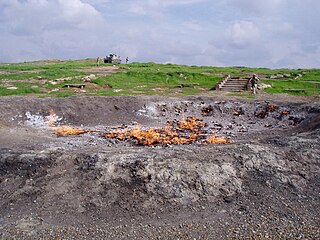
Baba Gurgur is an oil field and gas flame near the city of Kirkuk, which was the first to be discovered in Northern Iraq in 1927.
Sources include: Dow Jones (DJ), New York Times (NYT), Wall Street Journal (WSJ), and the Washington Post (WP).
Azeri–Chirag–Gunashli or Azeri–Chirag–Deepwater Gunashli is a complex of oil fields in the Caspian Sea, about 120 kilometres (75 mi) off the coast of Azerbaijan. It consists of the Azeri and Chirag oil fields, and the deepwater portion of the Gunashli oil field. An overall estimate of the area of the development is 432.4 square kilometres (167.0 sq mi). It is developed by the Azerbaijan International Operating Company, a consortium of international oil companies, and operated by BP on behalf of the consortium. The ACG fields have estimated recoverable reserves of about 5 to 6 billion barrels of petroleum. Peak oil production of 835,000 barrels per day (132,800 m3/d) was reached in 2010, however by the first quarter of 2022 production had declined to 434,000 barrels per day (69,000 m3/d), or about one-half of peak value. As of 2021, ACG oil accounted for 95% of all Azerbaijani oil exports.

The National Iranian Gas Company (NIGC) was established in 1965 as one of the four principal companies affiliated to the Ministry of Petroleum of the Islamic Republic of Iran with 25,000 million Rials initial capital.
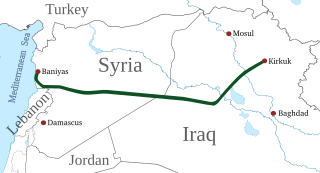
The Kirkuk–Baniyas pipeline is a currently defunct crude oil pipeline from the Kirkuk oil field in Iraq to the Syrian port of Baniyas. The pipeline went into operation in April 1952 and was formally opened in November.
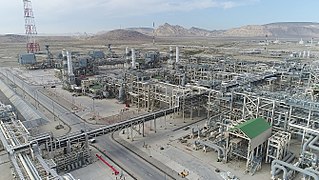
The Sangachal Terminal is an industrial complex consisting of a natural gas processing plant and oil production plant, located on the coast of the Caspian Sea 45 kilometres (28 mi) south of Baku, Azerbaijan.
As of 2017, Azerbaijan produced a range of metals and industrial minerals, including aluminum, bentonite, copper, gold, iodine, limestone, silver and steel.

Crescent Petroleum is the first and largest private upstream oil and gas company in the Middle East. Founded in 1971, Crescent Petroleum is headquartered in the Emirate of Sharjah, United Arab Emirates (UAE), with current operations in both the UAE and the Kurdistan Region of Iraq (KRI). As of 2023, Crescent Petroleum and the Iraqi Ministry of Oil have signed three twenty-year contracts as the company focus it efforts in aiding the redevelopment of Iraq.

The Kirkuk–Haifa oil pipeline was a crude oil pipeline from the oil fields in Kirkuk, located in the former Ottoman vilayet of Mosul in northern Iraq, through Transjordan to Haifa in mandatory Palestine. The pipeline was operational between 1935 and 1948. Its length was about 942 kilometres (585 mi), with a diameter of 12 inches (300 mm), and it took about 10 days for crude oil to travel the full length of the line. The oil arriving in Haifa was distilled in the Haifa refineries, stored in tanks, and then put in tankers for shipment to Europe.

Economy in Kurdistan Region consists of the autonomous economy in Kurdistan region in northern Iraq. The Kurdistan region's economy is dominated by the oil industry, agriculture, manufacturing and tourism.

Iraq was the world's 5th largest oil producer in 2009, and has the world's fifth largest proven petroleum reserves. Just a fraction of Iraq's known fields are in development, and Iraq may be one of the few places left where vast reserves, proven and unknown, have barely been exploited. Iraq's energy sector is heavily based upon oil, with approximately 94 percent of its energy needs met with petroleum. In addition, crude oil export revenues accounted for over two-thirds of GDP in 2009. Iraq's oil sector has suffered over the past several decades from sanctions and wars, and its oil infrastructure is in need of modernization and investment. As of June 30, 2010, the United States had allocated US$2.05 billion to the Iraqi oil and gas sector to begin this modernization, but ended its direct involvement as of the first quarter of 2008. According to reports by various U.S. government agencies, multilateral institutions and other international organizations, long-term Iraq reconstruction costs could reach $100 billion (US) or higher.
According to the United States Energy Information Administration (EIA), Pakistan may have over 9 billion barrels (1.4×109 cubic metres) of petroleum oil and 105 trillion cubic feet (3.0 trillion cubic metres) in natural gas (including shale gas) reserves.
Iraq's large oil reserves have attracted attention from the United Kingdom, a country with a high demand for oil. British involvement in the Iraqi oil industry dates to World War I. Political influence in the region has given the UK the power to establish a number of oil companies in Iraq.
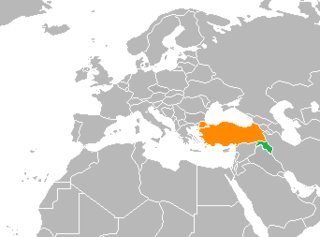
Turkey’s historic relationship with Iraq and Kurdistan Region has wavered between indifference and courtship, but the constant has been a layer of mistrust emanating from both ends that appears to have been set aside in 2001 when the new Turkish government reversed the status quo and embraced a policy of engagement that has successfully catapulted the country to becoming a leading economic player in the Middle East.